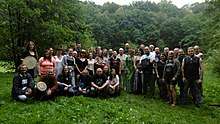Slavic Native Faith in Poland
Slavic Native Faith in Poland (Rodnovery; Polish: Rodzimowierstwo) has in 2007, according to Scott Simpson, between 2000 and 2500 "actively engaged and regular participants".[1]
| Part of a series on |
| Slavic Native Faith |
|---|
 |
|
Denominations Not strictly related ones:
|
|
Spread |
|
Sources
|
History
In 1818, the Polish folklorist and Slavophile Zorian Dołęga-Chodakowski (pseudonym of Adam Czarnocki; 1784–1825) stated that Poland "must return to [the] native faith". According to that, he's recognised as precursor of the Slavic Native Faith in Poland.[2] Another precursor in Poland was Jan Sas Zubrzycki (1860–1935), who elaborated the doctrine of "God-Knowing" (Bogoznawstwo).[3]
In the interwar period, a few movements emerged in Poland, recognized as early Polish Slavic Native Faith followers: the Święte Koło Czcicieli Światowida ("Holy Circle of Worshippers of Svetovid"; 1921) of Władysław Kołodziej (1897–1978), Demiurg (1934), and Zadrugism (1937) of Jan Stachniuk (1905–1963).[4] Another example is the pilot and army officer Zdzisław Harlender (1898–1939), who advocated Polish Native Faith in his book Czciciele Dadźbóg Swarożyca ("Worshipers of Dadźbóg Swarożyc", 1937).[5]

Rodnover organisations in Poland
The major organisation of Rodnovery in Poland is the Rodnover Confederation.
There are five formally registered religious organisations:
- Native Polish Church;
- Polish Slavic Church;
- Religious Organisation of Polish Rodnovers "Rod";[6]
- Rodzima Wiara ("Native Faith");
- West-Slavic Religious Organization "Slavic Faith".
References
Citations
- Simpson 2017, p. 82.
- Simpson 2000, pp. 50-51.
- Simpson & Filip 2013, p. 28.
- Simpson 2000, pp. 67-80.
- Simpson 2012, p. 11.
- "Powołanie nowego związku wyznaniowego" [Creation of a new religious association]. Duchtynia (in Polish). 13 June 2017.
Sources
- Simpson, Scott (2000). Native Faith. Polish Neo-Paganism at the Brink of the 21st Century. Religiologica Juventa. Kraków: Zakład Wydawniczy Nomos. ISBN 8388508075.CS1 maint: ref=harv (link)
- Simpson, Scott (2012). "Strategies for Constructing Religious Practice in Polish Rodzimowierstwo". In Anczyk, A.; Grzymała-Moszczyńska, H. (eds.). Walking the Old Ways: Studies in Contemporary European Paganism. Katowice: Sacrum.CS1 maint: ref=harv (link)
- Simpson, Scott (2017). "Only Slavic Gods: Nativeness in Polish Rodzimowierstwo". In Kathryn Rountree (ed.). Cosmopolitanism, Nationalism, and Modern Paganism. New York: Palgrave Macmillan. pp. 65–86. ISBN 9781137570406.CS1 maint: ref=harv (link)
- Simpson, Scott; Filip, Mariusz (2013). "Selected Words for Modern Pagan and Native Faith Movements in Central and Eastern Europe". In Kaarina Aitamurto; Scott Simpson (eds.). Modern Pagan and Native Faith Movements in Central and Eastern Europe. Durham: Acumen. pp. 27–43. ISBN 9781844656622.CS1 maint: ref=harv (link)
Further reading
- Schaab, Philipp (2019). Götter, Ahnen, Blut und Boden? Die Konstruktion ethnischer Identität im gegenwärtigen slawischen Neuheidentum in Polen. Religionen in der pluralen Welt (in German). 18. Berlin: Lit Verlag. ISBN 9783643145123.CS1 maint: ref=harv (link)